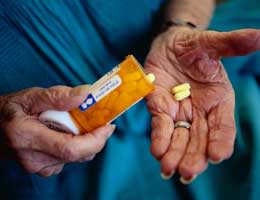Health library
Back to health libraryHow to reduce the risks of opioids

If you've recently had surgery or an injury, your doctor may have prescribed an opioid—such as hydrocodone, oxycodone or codeine—to help ease your pain.
Opioids are powerful drugs that work well. But like many medicines, there are risks associated with taking them. Here are seven tips that can help minimize those risks:
1. Tell your doctor about any other medicines that you take. Some drugs, including sleeping pills and medicines for anxiety, can interact with opioids, according to the U.S. Food and Drug Administration (FDA). Even if you only take a drug every now and then, your doctor needs to know.
2. Ask your doctor about serious side effects. Learn which potential opioid side effects might warrant a call to your doctor or a visit to the emergency department. The directions or other information that came with your prescription may include this information too.
3. Never take more pills than you should. One accidental overdose of an opioid could be fatal. If you're still having a lot of pain despite taking the recommended dose, tell your doctor. Also, for safety's sake, take your opioid exactly as prescribed. Otherwise, it may do more harm than good.
4. Speak up about addictions. If you haven't done so yet, tell your doctor about any personal or family history of substance abuse or addiction to drugs or alcohol, or if you have a history of smoking cigarettes.
5. Lock up your medicines. Prevent curious kids—and anyone else—from abusing or accidentally overdosing on your pain pills. Many teens who use heroin (an illegal opioid) became addicted first to prescription opioids that they got from family or friends, according to the American Academy of Pediatrics.
6. Don't keep any extra medicine or share it with family or friends. What helps you could harm someone else. Take any leftover medication to a drug take-back program. Some opioids can be flushed down the toilet. See the instructions that came with it for information, the FDA recommends.
7. Ask your doctor about naloxone. This medicine can reverse an opioid overdose. It may never be needed, but it often makes sense to have it on hand just in case, advises the FDA.
Knowledge is good medicine
Discover more medication safety tips in our Medications health topic center.
Reviewed 1/8/2026
